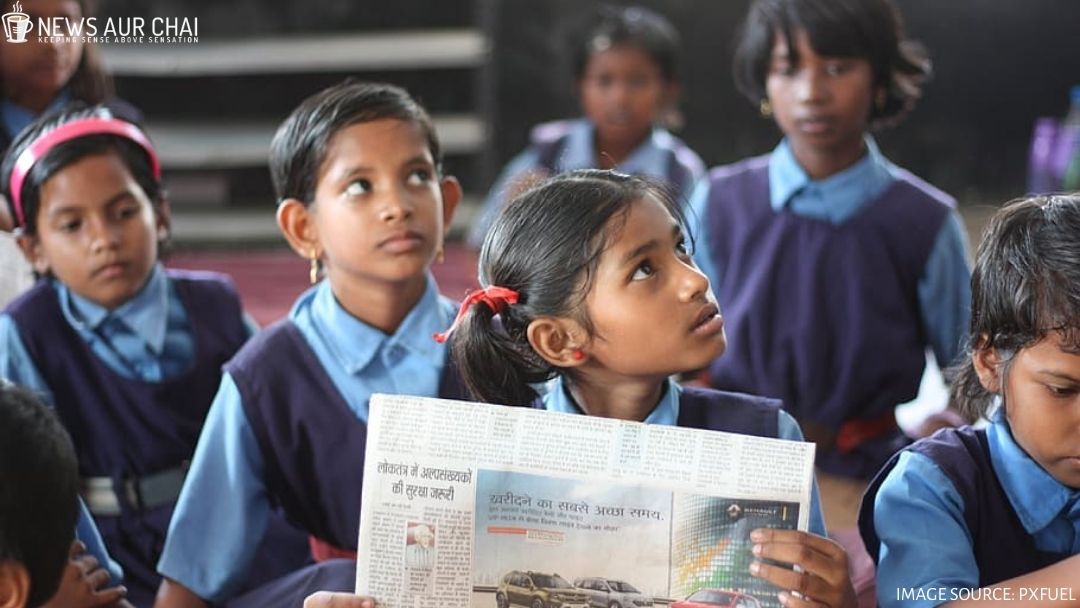
The Union Cabinet on Wednesday announced the National Education Policy 2020 (NEP) bringing reform after 34 years, especially in higher education, shifting focus from academic to non-academic activities, fluidity in the course and giving priority to language diversity. After five years of consultation with the general public and other stakeholders via surveys, feedback and audits such a reform was announced.
The motto behind the policy is education for all, i.e., 100 per cent education in India, especially for youth generations, in addition to literacy for adults. Remember, literacy here mean overall growth– “Knowledge+Development.”
While announcing the NEP in detail, Higher Education Secretary, Amit Khare said that the government aims to increase the public investment in the education sector from the current 4.3 per cent to 6 per cent of GDP at the earliest.
All You Need To Know About ‘NEP 2020’
-
Reforms in Higher Education
1. Increase Gross enrolment ratio (GER): Aim of NEP is to increase the GER from 26.3 per cent (2018) to 50 per cent by 2035. Thus, this aim requires to add around 3.5 crore new seats to higher education
Targeting a 50% Gross Enrolment Ratio (GER) in higher #education by 2035.
While a number of new institutions may be developed to attain these goals, a large part of the capacity creation will be achieved by consolidating/expanding/improving existing HEIs. pic.twitter.com/fVxPeKmkip
— Ministry of Education (@EduMinOfIndia) July 29, 2020
2. Multidisciplinary Education: Multidisciplinary Education and Research Universities (MERUs), at par with IITs, IIMs, to be set up as standards of best multidisciplinary education of global standards in the country. Introduction to multidisciplinary, holistic undergraduate education with a flexible curriculum, creative combinations of subjects, integration of vocational education and multiple entry and exit points with appropriate certification. Undergraduate education can be of three or four years with multiple exit options and proper certification within this period.
#NEP2020
🟠The UG degree will have multiple exit options.🟠
An Academic Bank of Credit shall be established which would digitally store the academic credits earned from various recognized HEIs so that the degrees from an HEI can be awarded taking into account credits earned. pic.twitter.com/yf5h2ai6UI— Ministry of Education (@EduMinOfIndia) July 29, 2020
3. Financial support for students: The National Scholarship Portal will be expanded to support, foster, and track the progress of students receiving scholarships, especially students belonging to economically weaker sections (EWS).
4. Open and Distance Learning: Efforts such as online courses and digital repositories, funding for research, improved student services, credit-based recognition of Massive open online course (MOOCs), and others will be taken to ensure it is at par with the highest quality in-class programmes.
5. Online and Digital Education: E-education promotion, especially during the pandemic, a dedicated unit for the building of digital infrastructure, digital content and capacity building will be created in the Ministry of Education to look after the e-education needs of both school and higher education.
6. Technology in Education: An autonomous body, the National Educational Technology Forum (NETF), will be created. The purpose of this would be to provide a platform for the free exchange of ideas on the use of technology to strengthen learning, assessment, planning, administration.
With an objective to improve multiple aspects of education, the use and integration of #technology will be encouraged & supported.
Efforts will be focused on emerging disruptive technologies that can help us transform the #education system & empower our educators. pic.twitter.com/fXxj2vODbU
— Ministry of Education (@EduMinOfIndia) July 30, 2020
7. Promotion of Indian Languages: To ensure the preservation, growth, and vibrancy of all Indian languages, NEP recommends to set up an Indian Institute of Translation and Interpretation (IITI), National Institute (or Institutes) for Pali, Persian and Prakrit, strengthening of Sanskrit and all language departments in HEIs (Higher Education Institutes), and use mother tongue/local language as a medium of instruction in more HEI programmes.
#NEP2020
The medium of instruction (preferably) till Grade 8 & beyond, will be the home language/mother-tongue/local language/regional language.
Starting from the Foundational Stage, children will be exposed to different languages with a particular emphasis on the mother tongue. pic.twitter.com/w5hM3riTpF— Ministry of Education (@EduMinOfIndia) July 29, 2020
8. Professional Education: NEP recommends that all professional education will be an integral part of the higher education system. Stand-alone technical universities, health science universities, legal and agricultural universities etc will be multidisciplinary institutions.
- School Education Reforms:
1. Universal Access: The NEP 2020 brings about some significant reforms to ensure that universal access to elementary education (preschool to secondary) for every individual.
The universal access provision includes infrastructure support, innovative education centres, tracking of students and their learnings, facilitating multiple pathways to learning (both formal and non-formal education) and association of counsellors with schools. The provision also emphasizes open learning for Grades 3, 5 and 8 through National Institute of Open Schooling (NIOS) and State Open Schools, secondary education programs equivalent to Grades 10 and 12, vocational courses, adult literacy and life-enrichment programs.
2. Childhood care and education: The ‘10+2’ structure of school curricula will be replaced by ‘5+3+3+4’ curricular structure, bringing the uncovered age group of 3-6 years under school curriculum, via considering age slots as 3-8, 8-11, 11-14, and 14-18 years.
#NEP2020
Ensuring universal access to high-quality Early Childhood Care and #Education across the country.#ECCE will focus on developing social capacities, sensitivity, good behaviour, courtesy, ethics, personal & public cleanliness, teamwork & cooperation among children. pic.twitter.com/qQ3JVoqHW8— Ministry of Education (@EduMinOfIndia) July 29, 2020
3. National Mission: A National Mission on Foundational Literacy and Numeracy will be set up by the MHRD now as the Ministry of Education. The States Education Board will be responsible and answerable to prepare an implementation plan for attaining this National Mission on foundational literacy and numeracy in all primary schools for all learners up to Grade 3 by 2025
4. Reforms in School curriculums: Shifting focus from academic to non-academic activities is the aim of this reform. Thus, bringing students forward in creative works, which can enhance their abilities with academic education. The rigid separation between arts and science is abolished, by giving students the freedom to choose subjects which they want to learn.
#NEP2020
Cash rich content will be reduced to its core essentials, and make space for critical thinking, holistic, enquiry-based, discovery-based, discussion-based, and analysis-based learning. pic.twitter.com/NVZmIXDjho— Ministry of Education (@EduMinOfIndia) July 29, 2020
Example if you are a science stream student, you will be still free to learn Home Science subjects along with Chemistry or Learning Humanities subjects along with Physics or vice versa. Vocational education will be started in schools from the Grade 6 and will include internships as well to promote growth and development in all manner.
5. Language Diversification: The NEP 2020 emphasises on mother tongue/local language/regional language as the medium of instruction at least till Grade 5, or Grade 8 and beyond. Sanskrit to be offered at all levels of school and higher education as an option for students, as a part of the three-language formula. Other classical languages and literatures of India will also be available as options. No Language obligation will be imposed on any student.
6. Assessment Reforms: A new National Assessment Centre, PARAKH (Performance Assessment, Review, and Analysis of Knowledge for Holistic Development), will be set up as a standard-setting body for assessments. Board exams for Grade 10 and 12 will be continued, but redesigned with holistic development as the aim.
7. Equitable and Inclusive Education: NEP 2020 provides Special Education Zones for disadvantaged regions and groups, Children with disabilities will be enabled to fully participate in the regular schooling process with all the requirements they need to be provided at the institutes.
#NEP2020
Equitable and Inclusive Education:
👉Emphasis will be given on Socially & Economically Disadvantaged Groups.
👉School complexes will be supported for providing children with disabilities facilities to suit their needs, ensuring their full participation in the classroom. pic.twitter.com/P36xtKUhnI— Ministry of Education (@EduMinOfIndia) July 29, 2020
Making the NEP announcement, Union Minister Prakash Javadekar said, “The Cabinet under Prime Minister Narendra Modi has given approval to New Education Policy for the 21st century. It is important, as for 34 years there were no changes in the education policy.” The Cabinet also approved a proposal to rename the Ministry of Human Resource Development as the Ministry of Education.






One Comment